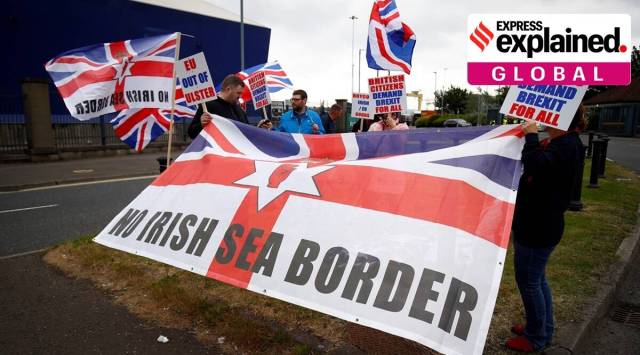Latest Comment
Post Comment
Read Comments
 The protocol was an integral part of the 2019 Brexit agreement signed between then-Prime Minister Boris Johnson and the EU. (Photo: Reuters)
The protocol was an integral part of the 2019 Brexit agreement signed between then-Prime Minister Boris Johnson and the EU. (Photo: Reuters) The United Kingdom Supreme Court on Wednesday (February 8) ruled that the Northern Ireland Protocol, which is a post-Brexit agreement that created a trade border between Northern Ireland and the rest of the UK, is lawful.
The apex court unanimously rejected appeals filed by pro-Brexit activists and former leaders of Northern Ireland’s largest unionist parties, who argued that the protocol breached the 1800 Act of Union and the Northern Ireland Act 1998.
The decision has come just a couple of days after the British media reported that the European Union and the UK “negotiators have made a breakthrough in reducing checks on goods moving between Great Britain and Northern Ireland, as part of efforts to resolve the long-running dispute over the Northern Irish protocol”, The Guardian said.
The protocol was an integral part of the 2019 Brexit agreement signed between then-Prime Minister Boris Johnson and the EU. However, in 2021, Johnson said he wants a full-scale renegotiation and later, proposed legislation that seeks to unilaterally override parts of the protocol. The UK also admitted to violating the agreement.
The announcement was opposed by the EU, which claimed that “going back on the deal breaches international law”, the BBC reported. Since then, the EU and the UK have been involved in discussions regarding the issue.
What is the Northern Ireland Protocol?
After Brexit, Northern Ireland remained the UK’s only constituent that shared a land border with an EU member, the Republic of Ireland. EU and UK having different product standards, checks would be necessary before goods could move from Northern Ireland to Ireland.
However, the two sides have had a long history of conflict, with a hard-fought peace secured only in 1998 under the Belfast Agreement, also called the Good Friday agreement. Fiddling with this border was thus considered too dangerous, and it was decided the checks would be conducted between Northern Ireland and Great Britain. This was called the Northern Ireland Protocol.
Under the protocol, Northern Ireland remains in the EU single market, and trade-and-customs inspections of goods coming from Great Britain take place at its ports along the Irish Sea.
What are the changes that the UK wants in the protocol?
The UK government has proposed the creation of a ‘green lane’, which would have fewer checks and customs controls only for goods going to Northern Ireland. Meanwhile, a more stringent ‘red lane’ would be for goods going on to the Republic of Ireland and the rest of the EU.
The plan also includes that changes in tax rules, such as spending and tax policies for Northern Ireland be decided only by London, and a proposal that businesses in Northern Ireland be allowed to choose between UK or EU standards.
According to the BBC, the UK also seeks “an independent body to settle disputes over the Northern Ireland Protocol, rather than the European Court of Justice.”
What has the EU said?
In June 2022, the EU launched legal proceedings against Britain for not keeping to the protocol and urged the government to return to the negotiating table.
The BBC reported that although the bloc has refused to negotiate the protocol, it has offered to “work on how the rules apply”.
The dialogue between the two sides resulted in signing a deal, in January 2023, between them on sharding data regarding trade. “This will allow the EU to access the UK’s IT systems for detailed information about goods flowing from Great Britain to Northern Ireland”, the BBC reported.
Both sides have expressed the desire to resolve the issue before the 25th anniversary of the Good Friday Agreement in April.

